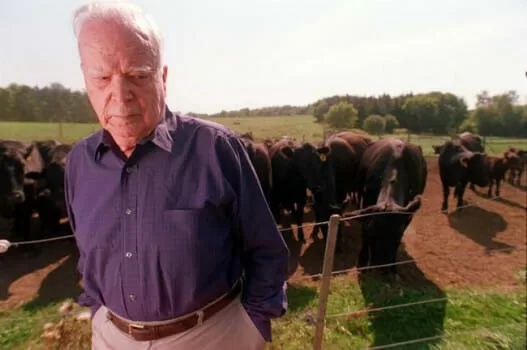My friend Willard Cochrane’s last book, The Curse of American Agricultural Abundance, came out in 2003. In that book, he proposed that most of the High Plains be taken out of agricultural production and returned to grassland wildlife habitat. This was pure Cochrane. Do not suffer fools. Do not think small. Do what needs to be done no matter what the consequences. Be proud to be called an iconoclast.
Cochrane is best known for his days in Washington with the Kennedy Administration. He established and led the modern Economic Research Service, was instrumental in instituting the food stamp program, and proposed a quota system that would, once and for all, end the problem of over production in U.S. agriculture. The quota system is born of what I think is Cochrane’s greatest contribution to our understanding of the agricultural economy. Especially in his masterwork Farm Prices: Myth and Reality, Will laid out a convincing argument that the free market system simply will not work for agriculture. Government intervention is necessary.
Cochrane’s quota proposal would have been no more than a tempest in some academic teapot at any other time. But in the early 1960s, it was national news. And, to opponents, it was still another example of how communist sympathizers wanted to take away our freedom. Will once showed me a file he had kept from those days. Titled “Killer of Farm Freedom,” it was filled with various articles and political cartoons. Soon enough, the defenders of farm freedom had will packing for a one-way return to Minnesota. The sting and bitterness of his Washington years was compounded when the prestigious Regents Professorship he expected upon his return never materialized.
I did not know him before those times, and only came to know him years after. The Cochrane I knew was still more than a match for any of his colleagues, and one who continued to be an outstanding contributor to his profession. But slowly, the more I heard the story of his Washington years, the more I realized that the Cochrane I knew was profoundly changed by the Washington years. He had fought the grandest fight in history of our profession and lost. I cannot begin to tell you how much I admired him for what he had done. For Will, however, it remained a bitter loss.
Our years together also gave me a greater appreciation for Cochrane’s enduring defense of family farming. Partly, it was motivated by boyhood memories of his grandparents’ farm in Iowa. But there was more to the story. Cochrane was among the first in our profession to become seriously concerned about concentration in the food system. In his view, farms could become so large as to eliminate competition and cause consumer prices to rise. Much later, he came to see he was only partly right on that one – the real threat of concentration was at the processor and retail levels. As only Cochrane could put it, “If the elephant walks into your living room, it doesn’t matter if it is a good elephant or a bad elephant. It is still going to break something.”
Neither Washington, nor anything else, for that matter, robbed Will of his one-of-a-kind nature. He could as easily discuss Faulkner as he could Keynes, and once referred to someone on his long list of undesirables as a “Snopes.” His love of the West made him an outspoken conservationist. And he had a unique and unforgettable sense of humor. Two examples come to mind.
In one, we were at our usual Tuesday lunch, just the two of us, when Will expressed an interest in our waitress in a way best termed inappropriate. Nervously trying to shut him up before we were asked to leave, I told Will that no one that age would be interested in a man in his 90s. “Listen here, Dick,” he responded. “I’m one Powerball hit away from being a very attractive man.”
The other came in Cambridge, Massachusetts, during a visit to see his old friend John Kenneth Galbraith. Galbraith was in the last two years of his life, but still a regal and imposing presence if ever there was one. I suspect even Will was a little intimidated. For sure, I was. But as the conversation went along, Galbraith said something that gave Will his opening. With a nod towards me, Will said, “Ken, my personal attendant has a PhD.” Even the great Galbraith was left speechless.
As we got older, our conversations turned more towards his frequent reading of Lonesome Dove, to the ultimate indignity of living in a retirement home populated by a bunch of damn Republicans, and to what we would do when he won the Powerball. But he was always capable of making incisive and wonderful comments on whatever economics I was trying to do. On the longshot that I ever write anything of lasting significance, odds are that it will come from one of those conversations.
Oh, and before I forget, I suppose I can finally reveal Will’s secret to longevity, the “three B’s”–daily consumption of blueberries, black walnuts and Black Label scotch.
*
This article originally appeared in Agro Washington in fall 2012, volume 10, number 1. Read more about Cochrane in Richard A. Levin’s biography Willard Cochrane and the American Family Farm.
- Remembering Willard Cochrane, by Richard A. Levins - May 7, 2020

